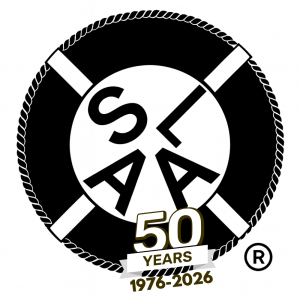The Question:
I have some Traditions Questions. 1 – We do not read the Traditions at the S.L.A.A. meeting in my area. Many members only attend 1 S.L.A.A. meeting, one day a week so they do not have exposure to the Traditions and are not familiar with the basic 12 Step program. My question is whether I can stop by AA and pick up a copy of the Traditions and substitute the S.L.A.A. for AA, or should I get an official copy? 2 – I got the Al- Anon trifold with the statement: Whom you see here, what you hear here, when you leave here let it stay here.” someone from our group threw it out because it is Al anon and not S.L.A.A. I notice you have an anonymity comment coming up on our website; I want to know if it is okay to use the Al-Anon pamphlet at my meeting?
It is unfortunate that any meeting does not read the 12 Traditions at some point during their meeting. I can remember when I first came into S.L.A.A. that my home group didn’t read the Traditions; when this was mentioned in a Group Conscience meeting the group decided to add the reading of the Traditions at the beginning of the meeting along with the 12 Steps. It is unfortunate that many people have no idea what the 12 Traditions mean to the Program as a whole. The Traditions show us how the Program works. We eventually decided that on one week each month we would use the AA book Twelve Steps and Twelve Traditions in order to study the Traditions and what they mean to us. This is a Tradition 4 issue because each group, being autonomous, can decide what format will be followed in its meeting. We introduced the book as an AA publication and explained that we were using it because S.L.A.A. does not have its own writings on the Traditions. Another group in my area uses the book Hope and Recovery for their Traditions studies, for the same reason.
As far as how to obtain a copy of the 12 Traditions, it isn’t necessary to go to the local AA Central Office. The Traditions can be downloaded from the FWS Website (slaafws.org) under the literature tab and follow the link under the 7 Core Documents to download a copy. If someone doesn’t have a computer, they can also be found on pages 122 and 123 of the Basic Text.
As to the second part of the question regarding the closing statement; virtually every meeting I have ever attended uses some variation of this statement. Again, this is a Tradition 4 issue and the group can decide whether or not to use it.
As long as outside literature is identified as such it could be used at the digression of the local group so long as it is a Group Conscience decision.
I think the Traditions can be copied from the AA traditions, with SLAA substituted, can they not? Also–aren’t they listed in our SLAA Textbook? As to “whom you see here, what you hear here, let it stay here when you leave here”–I know that is stated during SAA meetings. Would there be any reason why local Intergroups couldn’t say it at their SLAA meetings if they wanted to? I think it is a good reminder for people about confidentiality.
I also think that any materials that promote recovery within us should be utilized. All of Carnes’ books, Melanie Beattie has some good books, Everyone at our local meetings understands that these are NOT conference approved materials and are being used as supplemental healing materials. Anything that makes us think about our addictions– and helps us to better understand and cope with the addictions—is helpful. The little daily readings from Answers in the Heart almost always seem very pertinent to me. The sharing of information that is meaningful to each of us, to me, is a strong point of our recovery.
My answer might be lengthy, but I like to document my stuff.
Regarding the traditions, I first refer to tradition 4 which says that each group should be autonomous except in matters affecting other groups or S.L.A.A. as a whole. In light of this tradition, any group could chose to use either AA or SLAA traditions. Since we do not yet have a Twelve Steps and Twelve Traditions book in S.L.A.A., the A.A. Traditions can certainly be used. You can even use non-conference approved material, as long as you state it as such. The following statement is suggested: This group uses the following non-conference approved literature (list the literature). This literature is not approved by the SLAA Conference, but is suggested for this meeting through group conscience (cf, Motion 06-03, passed in 2006, p. m-38 of Index of Motions).
In reference to tradition 5, according to which: “Each group has but one primary purpose — to carry its message to the sex and love addict who still suffers” we could rely on another motion passed in 1980 (page M-28 of Index) which says: “Guided by A.A. experience, we will adhere to the principles contained in the Twelve A.A. Traditions, adapted as appropriate to the differing agent of addictive abuse”. Furthermore, we can find, in the Basic Text the following:
“If you are thinking as you read this book that S.L.A.A. may be a fellowship worth serious consideration for your own problems, we recommend that you also read the books Alcoholics Anonymous (especially chapters 5-7) and Twelve Steps and Twelve Traditions.
We have found these books, in spite of their occasionally somewhat dated ideas and language, to be surprisingly appropriate and useful to us in applying the Twelve Steps to sex and love addiction. We substitute such words as ‘our addiction’ or ‘sex and love addiction’ for the direct references to alcoholism in those books. ”
Plus, the A.A. Traditions appear at the bottom of the S.L.A.A. Traditions. So, I would not see any counter indication to use the A.A. Traditions, as they are used to carry the message in a way “pioneered by A.A.” (S.L.A.A. Preamble).
However, on a more practical level, and if we are strictly talking about just the list of the twelve traditions, it can be easily downloaded from the English page of the SLAA Website, page in which you will find the seven core documents (https://slaafws.org/english) . If one cannot access Internet without endangering one’s sobriety, maybe someone from the group who can could get the document. Like in many groups, only the tradition of the month can be read each month.
Q2- I don’t know that the statement: Whom you see here, what you hear here, when you leave here let it stay here, is from Al-anon, nor coming or belonging to any particular fellowship. We use it in our S.L.A.A. meetings, and I know it is being used in other fellowships too, printed with their own logo. As this is not a piece of literature per say, but rather an illustration of the concept of anonymity, I do not see that it might be discarded as non S.L.A.A. literature. Again, according to Tradition 4 (each group is autonomous, etc.), I believe it would be up to group conscience to decide if they want to use the statement. Maybe, if the group doesn’t like that it be printed on an Al-Anon trifold, they could make an anonymous one.
My experience is that use of outside literature that is 12 Step literature from other 12 Step fellowships is very helpful for recovery in SLAA. Also that reading books like Patrick Carnes book on sexual anorexia contributes a lot to recovery. The AA Big Book suggests using outside sources for recovery. I think it is important to clearly explain that the literature is either S.LA.A. Conference approved S.L.A.A. draft literature, or outside literature.
I think the meetings that use outside literature benefit a lot from it. S.L.A.A. literature is very incomplete and very inadequate, even though it is very good. Why should we all have to go to meetings of other programs to fill in the gaps in our recovery that are not covered in our S.L.A.A. literature? Does this create unity? I think our unity comes from our common desire to recover from our diseases by together using whatever is needed with use of the Steps and Traditions. I do not think that eliminating helpful outside literature from our meetings causes unity. I think it fragments the lives and recovery of our members by creating chaos in all our lives by having to go to so many other meetings of other fellowships to find our recovery. Meetings are autonomous and Intergroups should not dictate their activities or drop them from the SLAA meeting list because they are seeking healthy recovery for their members from outside literature. We do not have S.L.A.A. police. And Intergroups should not act like police.
I find communities that read and study outside literature in their S.L.A.A. meetings have more recovery and serve the newcomer, struggler, and long timers better than the communities where the “no non-conference approved’ police rule the roost. My experience is that ‘no non-conference approved’ creates chaos, floundering, and struggling rather than unity in SLAA. Other fellowships with other topics might be different. I think we need to do what is good for us rather than copycat others.
Regarding the ‘let it stay here’ phrase; I think it is used in so many fellowships that it is not copyrighted or outside literature, but just a common saying. I think we should use it because it benefits our members, new comers, stragglers and long timers and helps create unity.
These are some of my thoughts on this topic.
I come from an AA background and when I was slipping in S.L.A.A. for 4 years I was told by my sponsor to fire my S.L.A.A. sponsee. My sponsee wouldn’t hear of it and became sort of an AA sponsee. We read the AA big book each week. I substituted “the qualifier” wherever it said alcohol. This showed me the extent of my S.L.A.A. disease. It’s one of the things that I point to that led me to my S.L.A.A. spiritual experience. In another program, we don’t have our own twelve and twelve book so we use the AA twelve and twelve and substitute food for alcohol – it says in our meeting format “we feel we identify absolutely.” Until we get our own 12 and 12 out, I would be in favor of reading AAs literature. About the Al-Anon pamphlet-tradition 4 states each group should be autonomous. We’ve had non-conference approved literature at a few of my meetings over the years and members have been opposed but the meeting would state that it was non-conference approved. They each took their own group conscience. Then there’s the “except in matters affecting other groups or S.L.A.A. as a whole.” In my food program, we were reading the OA twelve and twelve and our intergroup told us to stop or they would have to take us off their meeting list. It made newcomers think we were an OA meeting. So in favor of tradition one “our common welfare should come first, personal recovery depends upon unity” we stopped reading it.


